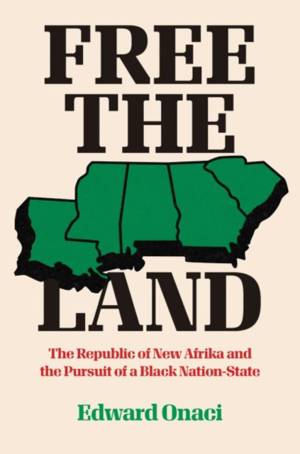
Je cadeautjes zeker op tijd in huis hebben voor de feestdagen? Kom langs in onze winkels en vind het perfecte geschenk!
- Afhalen na 1 uur in een winkel met voorraad
- Gratis thuislevering in België vanaf € 30
- Ruim aanbod met 7 miljoen producten
Je cadeautjes zeker op tijd in huis hebben voor de feestdagen? Kom langs in onze winkels en vind het perfecte geschenk!
- Afhalen na 1 uur in een winkel met voorraad
- Gratis thuislevering in België vanaf € 30
- Ruim aanbod met 7 miljoen producten
Zoeken
€ 57,45
+ 114 punten
Uitvoering
Omschrijving
On March 31, 1968, over 500 Black nationalists convened in Detroit to begin the process of securing independence from the United States. Many concluded that Black Americans' best remaining hope for liberation was the creation of a sovereign nation-state, the Republic of New Afrika (RNA). New Afrikan citizens traced boundaries that encompassed a large portion of the South -- including South Carolina, Georgia, Alabama, Mississippi, and Louisiana -- as part of their demand for reparation. As champions of these goals, they framed their struggle as one that would allow the descendants of enslaved people to choose freely whether they should be citizens of the United States. New Afrikans also argued for financial restitution for the enslavement and subsequent inhumane treatment of Black Americans. The struggle to "Free the Land" remains active to this day.
This book is the first to tell the full history of the RNA and the New Afrikan Independence Movement. Edward Onaci shows how New Afrikans remade their lifestyles and daily activities to create a self-consciously revolutionary culture, and argues that the RNA's tactics and ideology were essential to the evolution of Black political struggles. Onaci expands the story of Black Power politics, shedding new light on the long-term legacies of mid-century Black Nationalism.
This book is the first to tell the full history of the RNA and the New Afrikan Independence Movement. Edward Onaci shows how New Afrikans remade their lifestyles and daily activities to create a self-consciously revolutionary culture, and argues that the RNA's tactics and ideology were essential to the evolution of Black political struggles. Onaci expands the story of Black Power politics, shedding new light on the long-term legacies of mid-century Black Nationalism.
Specificaties
Betrokkenen
- Auteur(s):
- Uitgeverij:
Inhoud
- Aantal bladzijden:
- 296
- Taal:
- Engels
- Reeks:
Eigenschappen
- Productcode (EAN):
- 9781469656144
- Verschijningsdatum:
- 29/06/2020
- Uitvoering:
- Paperback
- Formaat:
- Trade paperback (VS)
- Afmetingen:
- 156 mm x 234 mm
- Gewicht:
- 458 g

Alleen bij Standaard Boekhandel
+ 114 punten op je klantenkaart van Standaard Boekhandel
Beoordelingen
We publiceren alleen reviews die voldoen aan de voorwaarden voor reviews. Bekijk onze voorwaarden voor reviews.









